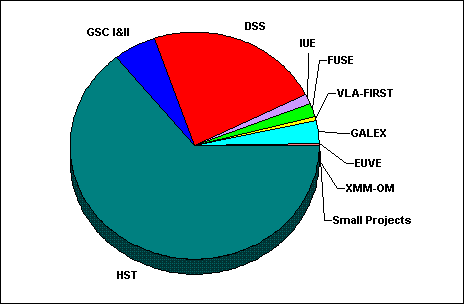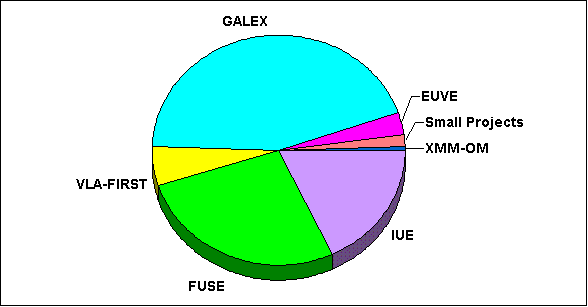|
|||||||||||||||||||
|
|
|||||||||||||||||||
NASA Data Center Annual Program Plan
| Program Year: | Reporting period July 2005 through June 2006 |
| Data Center/Service: | Multi-mission Archive at Space Telescope (MAST)
(Optical/UV Science Archive Research Center) |
| Supporting Organization: | Space Telescope Science Institute 3700 San Martin Drive Baltimore, MD 21218 |
Overall Mission: MAST supports active and legacy mission datasets and related catalogs and surveys, focusing primarily on data in the ultraviolet, optical, and near-IR spectral regions. Support includes curation of the data, providing expert support to users of the data, providing access to data-specific calibration and analysis software, providing user support for this software, and maintaining public access interfaces to the data. MAST works with new mission teams in the supported wavelength regions to assist in the development of data management plans, especially in the areas of data formats, descriptive metadata and standardization of keywords, in the development of data access and delivery plans, and assuring data quality control.
This report covers data financially supported under the "MAST" contract. Archive and distribution activities for HST data are supported under the HST contract. Some HST statistics are included in this report, but more complete information on HST activities can be found in the STScI Newsletters and in the STSci Annual Reports. Questions about HST can be directed to archive@stsci.edu.
| Total MAST Holdings by volume as of June 30, 2006
|
| MAST holdings without HST/GSC/DSS as of June 30, 2006
|
MAST Data Holdings
| Name | Size | Number of Observations | Active Mission Duration |
|---|---|---|---|
| ACTIVE MISSIONS | |||
| FUSE | 890.49 GB | 4372 | 1999- |
| GALEX | 1469.36 GB (public) ??? GB (proprietary) GB (catalog) |
??? (public) (proprietary) ??? (catalog objects) |
2003- |
| HST | 28.314 TB | 556,405 | 1990- |
| XMM Optical Monitor | 14.23(compressed) | 1646 | 1999- |
| LEGACY MISSIONS | |||
| ORFEUS: BEFS | 4.1 GB | 332 | Sept. 1993; Nov. 1996 |
| ORFEUS: IMAPS | 0.3 GB | 643 | Sept. 1993; Nov. 1996 |
| ORFEUS: TUES | 0.2 GB | 229 | Nov. 1996 |
| EUVE | 41.88 GB | 1367 | 1992-Jan. 2001 |
| ASTRO: UIT | 56 GB | 1442 | Dec. 1990; March 1995 |
| ASTRO: HUT | 0.6 GB | 516 | Dec. 1990; March 1995 |
| ASTRO: WUPPE | 0.1 GB | 238 | Dec. 1990; March 1995 |
| IUE Final Archive | 475 GB | 103,552 | 1978-1996 |
| IUE SIPS | 125 GB | 104,296 | 1978-1996 |
| Copernicus | 0.8 GB | 551 | 1972-1981 |
| CATALOGS & SURVEYS | |||
| VLA-FIRST | 183.98 GB (compressed) | 29,153 | 1993- |
| Digitized Sky Surveys | 5 TB | n/a | 1950-58, 1975-99 |
| GSC I, II | 2 TB | n/a | 1950-58, 1975-99 |
Services Provided: MAST provides support for users seeking to understand the properties and instrumental signatures of all archived datasets and assistance with the interfaces to browse and retrieve these data. Access to non-HST mission and instrument specific calibration and analysis software and assistance in its use continues on a time-available basis. Full support for HST related software is provided by the MAST Help Desk and staff.
Non-HST Data Analysis Software Provided: IUE "RDAF" package (IDL-based), IUE Final Archive processing software (IRAF port), EUVE analysis software package (IRAF-based), Copernicus data analysis software (IDL-based), UIT data reduction/analysis software (FORTRAN, C, and IDL routines), and HUT data reduction software (IRAF-based) are available through MAST.
Mission Interfaces:
Committee Participation within the STScI:
| Date | Ingest Volume (GB) - Active Missions | Retrieval Volume (GB) - Active Missions | Retrieval Volume (GB) - Legacy Missions | Datasets Retreived - Active Missions | Datasets Retreived - Legacy Missions |
|---|---|---|---|---|---|
| Jul 2005 | 372.616 GB | 1621.86 GB | 5.64 GB | 68275 | 22808 |
| Aug 2005 | 345.672 GB | 2012.31 | 1.14 GB | 66318 | 4955 |
| Sep 2005 | 265.9 GB | 1510.57 GB | 1.14 GB | 60650 | 2610 |
| Oct 2005 | 280.915 GB | 1367.96 GB | 1.11 GB | 35958 | 9203 |
| Nov 2005 | 334.460 GB | 1885.49 GB | 0.81 GB | 46536 | 2016 |
| Dec 2005 | 314.243 GB | 1471.66 GB | 28.85 GB | 55760 | 11195 |
| Jan 2006 | 387.592 GB | 2005.96 GB | 1.86 GB | 57290 | 832 |
| Feb 2006 | 345.456 GB | 1968.73 GB | 0.63 GB | 50301 | 909 |
| Mar 2006 | 456.053 GB | 1517.21 GB | 1.03 GB | 73615 | 3925 |
| Apr 2006 | 421.333 | 1682 GB | 4.68 GB | 42310 | 3251 |
| May 2006 | 1164.25 GB | 1685.53 GB | 1.36 GB | 53598 | 1443 |
| Jun 2006 | 220.723 GB | 3235.69 GB | .49 GB | 297336 | 613 |
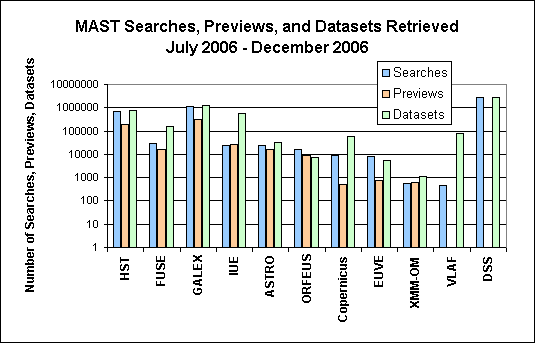 |
| The number of DSS searches is displayed in order to show the general interest level in these data. Previews are not available for VLA-FIRST data. |
 |
| This plot shows the number of datasets downloaded each month per mission during the reporting period |
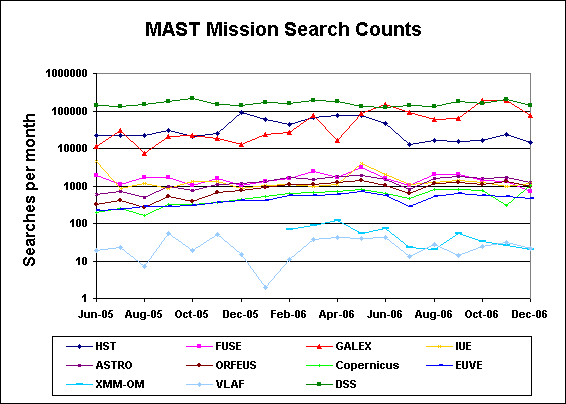 |
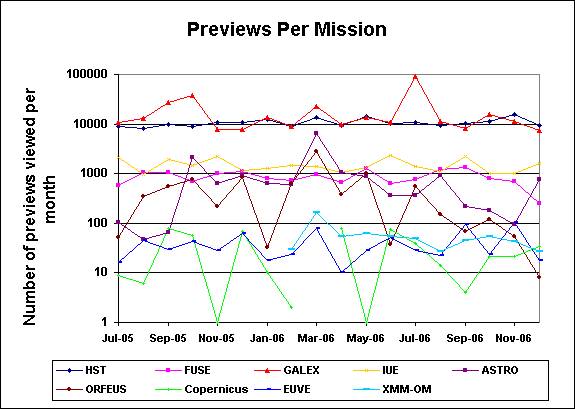 |
Data Discovery and Search Tools:
MAST has several search tools that complement the individual mission searches.

Scrapbook updates:
High Level Science Products:
Several sets of High Level Science Products (HLSP) were delivered and implemented this year.
Since the HLSP are located in an anonymous FTP area, MAST cannot precisely measure the number of distinct users downloading the data. However, we can tabulate the number of distinct domains downloading the data. During the reporting period, over 7500 distinct domains downloaded HLSP. The plot shown below shows the number of distinct domains for each set of HLSP . The number of domains for those HLSP sets acquired or significantly autmented during the reporting year are shown in pink.
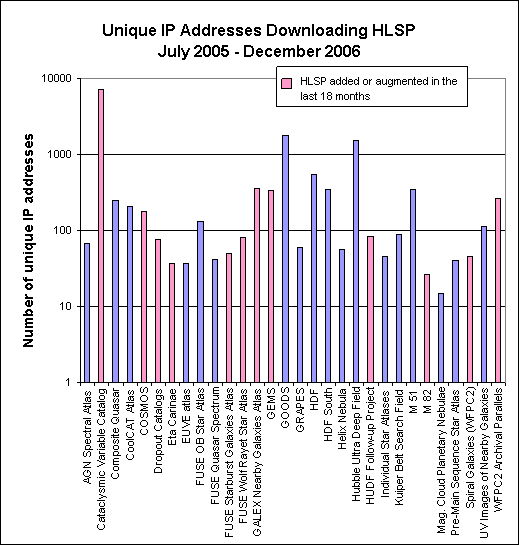
A complete listing of HLSP hosted at MAST is below. Although MAST provides an interface to the WFPC2 Associations, the data are held at CADC. MAST distributes the data via a proxy.
| High Level Science Product Holdings | ||
| High Level Science Product Set | Size (MB) |
Number of Files |
| 10 Lac (O9V) Spectral Atlas (HST/GHRS) | 5.120 | 67 |
| WFPC2 Archival Parallels (Proposal 9540) | 55004.433 | 16285 |
| Cataclysic Variable Star Catalog | 84.41 | |
| CoolCAT - A cool-star UV spectral catalog | 1386.833 | 1287 |
| Cosmic Evolution Survey - COSMOS | 88679.038 | 1890 |
| HST Treasury Program on Eta Carinae | 19080.154 | 980 |
| EUV Spectral Atlas of Stars (EUVE) | 26.302 | 479 |
| AGN and Quasar Spectral Atlas (HST/FOS) | 32.186 | 446 |
| Quasar Spectrum FUSE | 0.019 | 1 |
| FUSE Atlas of Starburst Galaxies | 7.784 | 52 |
| OB Stars (Galactic): FUSE Spectral Atlas | 27.985 | 184 |
| OB Stars (Magellanic): FUSE Spectral Atlas | 1.039 | 66 |
| FUSE Spectral Atlas of Wolf-Rayet Stars | 1.535 | 32 |
| GEMS: Galaxy Evolution from Morphologies and SEDs | 90125.028 | 465 |
| GOODS: The Great Observatories Origins Deep Survey | 93897.573 | 1342 |
| Grism-ACS Program for Extragalactic Science (GRAPES) | 76.852 | 1401 |
| Hubble Deep Field | 2076.525 | 181 |
| Hubble Deep Field South | 2631.798 | 67 |
| Hubble Helix Observations | 2445.491 | 25 |
| Pre-Main Sequence Stars: IUE Spectral Atlas | 9.488 | 732 |
| Hubble Space Telescope ACS mosaic images of M51, the Whirlpool Galaxy | 3407.603 | 31 |
| Ultraviolet Images of Nearby Galaxies | 362.085 | 224 |
| Quasar Spectrum HST/FOS | 0.391 | 1 |
| Search Field from a Search for Kuiper Belt Objects | 3609.877 | 8 |
| Hubble Ultra Deep Field Follow-on | 2525.076 | 7 |
| Ultra Deep Field ACS-HRC Parallels | 97.147 | 394 |
| Ultra Deep Field - ACS-WFC | 1411.111 | 13 |
| Ultra Deep Field NICMOS Parallels | 17.199 | 12 |
| Ultra Deep Field NICMOS-Treasury | 702.162 | 20 |
Plotting and graphical display tools:
New protocols and IVOA-related services:
New interface pages and search tools:
Enhancements of User Interface Pages and Tools:
-
MAST enhanced the mission cross-correlation search and the VizieR/Cross-correlation search routines to include the GALEX data.
-
-
Outreach to the user community:
- MAST conducted a comprehensive survey of user preferences, attitudes, and search practices. Results and responses to some comments were presented to the MAST Users Group and also placed on the web.
- MAST provides electronic newsletters as needed. This year two newsletters were distributed in November 2005 and June 2006.
- MAST staff participated in several conferences or workshops (AAS, ADASS, IVOA and NVO).
The Astrophysical Data Centers Executive Council (ADEC):
Coordination activities:
MAST Literature Links:
The publications database and the links between scientific papers and the referenced MAST datasets are regularly updated as new citations become available through the ADS. Below is a plot showing the number of papers published in referred journals during the reporting period (July 2004 through June 2005).
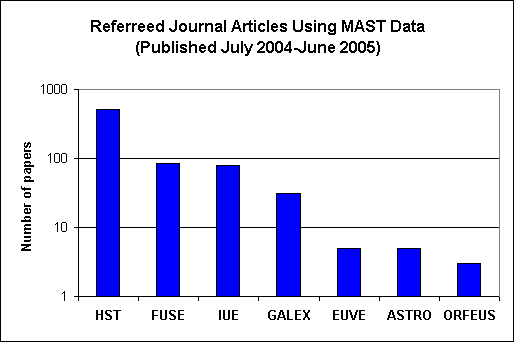
During the past year, MAST began to track the number of citations per paper in the journal database. We obtain the total number of citations per paper from the ADS. The count is updated at least once per month. Below is a chart that shows the average number of citations for papers published that year. The citation record for IUE from 1978 through 1990 is not included in this plot. The "fall-off" in the average number of citations per paper for those articles published more recently is due to the lag between publication of a paper and citation of a paper in a later publication. Meylan, Madrid and Macchetto published a paper in PASP,116:790 entitled "HST Science Metrics". These authors state that the peak of the citation rate occurs about 2 years after publication.
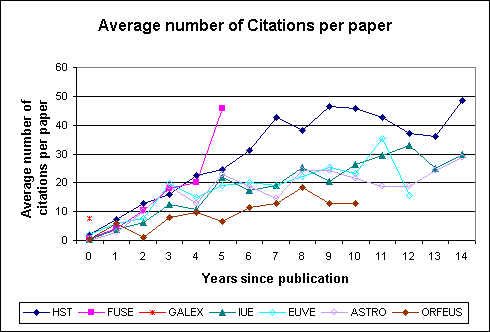
We show below a plot of the average number of citations per paper over the publication lifetime per mission. (If papers from the years 2004-2005 are excluded, the average number of citations per paper increases.)
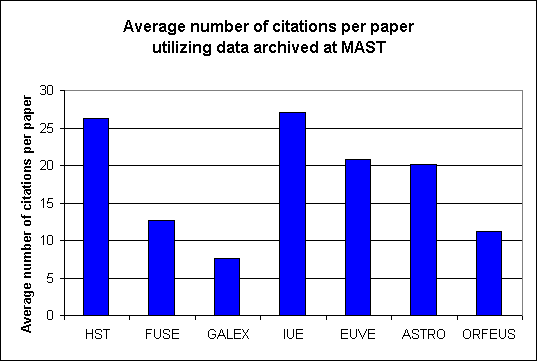
STAFFING CHANGES AT MAST
During the year Rachel Somerville left MAST and Alberto Conti scaled back participation in MAST activities. Shui-Ay Tseng joined the staff. Conti and Tseng are partially salaried from the MAST contract.
PLANS FOR COMING YEAR
Future datasets:
MAST will receive no datasets from new missions during the coming year. Data will continue to be relased steadily from FUSE and as GALEX Release 2, in late 2005.
Future Services for Ongoing Missions:
- MAST will provide a Spectral Services utility that permits users to
perform cone searches on objects for which GALEX grism spectra are
available. The service will permit users to manipulate spectra with
a coplotting tool. The MAST/GALEX group is also developing footprint
services that will permit users to perform general cross correlations
of objects in nonoverlapping GALEX sky fields and with objects observed
with GALEX and other survey missions. Shopping cart services are being
developed for GALEX public release data to permit users to create their
own customized fits files of collections of objects of interest.
- MAST hopes to be able to provide footprint services for a few legacy
missions or instruments by the end of the next reporting period.
- MAST will ingest a new FUSE data product: a merged spectrum called
an "nvo" file. This addition will permit users to work with the entire
FUSE wavelength range from a single file and will also permit FUSE
data to be conveniently accessed by IVOA search tools.
- MAST will develop the first generation database for the testing
of Kepler data (Kepler launch has slipped to mid 2008).
- MAST will distribute several new High Level Data products from a range of GI and HST-Treasury programs. These will include a (FUSE) Wolf-Rayet spectal atlas, a FUSE atlas of galaxies, GEMS (HST), HPOL data (in support of WUPPE), GOODS (version 2; HST), COSMOS (HST), Helix Nebula (HST/NICMOS), Eta Carina (HST/STIS), and a few B-star UV spectral atlases (IUE).
|
|
|




 Follow Us
Follow Us